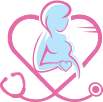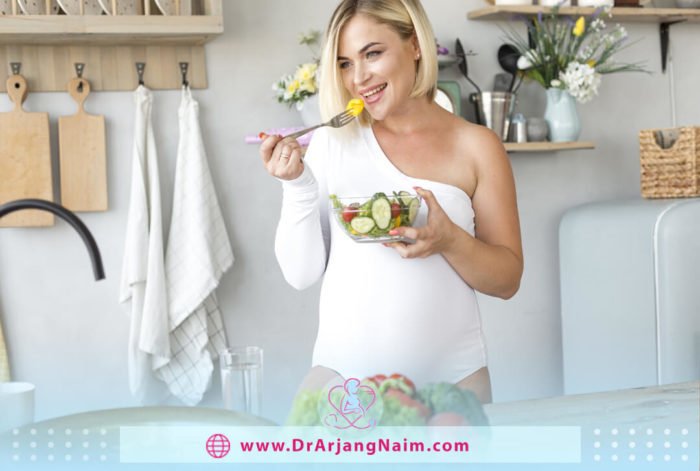The pregnant mother needs to know what foods to eat and what foods not to avoid during pregnancy. Pregnancy is one of the most important stages and experiences of life that requires a lot of attention and care to maintain the mother’s health, ultimately to ensure the health of the fetus. The importance of nutrition in pregnancy is undeniable and very important. Healthy nutrition during pregnancy has many benefits for both mother and fetus.
Pregnant women need to make sure that their diet provides enough nutrients and energy for the baby to grow properly. Mothers need to make sure their bodies are healthy enough to cope with the changes during this time. For a healthy pregnancy, the mother’s diet should be balanced and nutritious, including a good balance of protein, carbohydrates, fats, and a wide range of vegetables and fruits.
One of the first things people notice during pregnancy is the forbidden foods of this period. Fortunately, there are more foods that can be eaten during pregnancy than those that should not be eaten. It is enough to have a proper diet plan during pregnancy.
Foods to eat during pregnancy
The amount of calories a pregnant woman increases during pregnancy is not as much as two people. Normal weight gain, if the fetus is single, varies based on pre-pregnancy weight and other factors. During pregnancy, the mother’s body absorbs more iron, and blood volume increases. So she has to eat foods that have more iron to make sure she and her baby have enough oxygen.
Fruit and vegetables
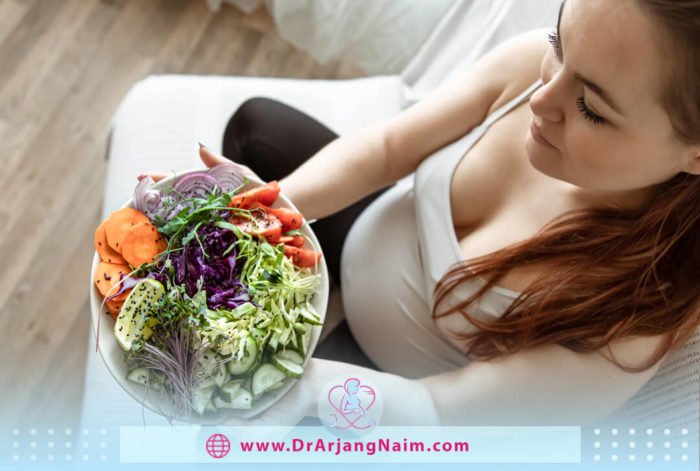
The mother should consume five servings of fruits and vegetables a day in her diet, which may be in the form of juice, dried fruit, canned fruit, frozen or fresh. Fresh and frozen (if frozen too soon after stacking) usually have higher vitamins and other nutrients. But eating fresh fruit is more recommended than fruit juice (because of its higher sugar content).
Complex carbohydrates
Complex carbohydrates include starchy vegetables such as butternut squash and sweet potatoes, whole grains such as Faro and buckwheat, and legumes such as beans or peas.
Foods high in starchy carbohydrates include potatoes, rice, pasta, and bread. Carbohydrates are high in energy and, therefore, one of the most important components of a proper diet during pregnancy. To the extent possible, complex carbohydrates should be used instead of simple ones.
Pregnant women with high blood sugar may need to monitor their carbohydrate levels carefully. An individual medical team, including an obstetrician and a nutritionist, can prepare the mothers’ diet.
Protein
Pregnancy is a period of rapid development. As a result, it is important to get the right amount of protein. It is important to focus on a wide range of protein sources as part of a balanced diet during pregnancy. Good sources of plant protein include:
- Lentils, beans, legumes, nuts, seeds, and nut butter
- Tofu and soy products
- Plant-based protein powders, such as pea protein powders
For example, animal proteins from chicken, beef, fish, or eggs, can also be part of a healthy pregnancy diet and contain essential amino acids.
Fats
Fats are an important part of any healthy diet and play an essential role during pregnancy. However, it is essential to know the types of fats and how much they are consumed. For example, getting omega-3 unsaturated fatty acids during pregnancy is very important. In addition, high intake of saturated fat can increase the risk of pregnancy complications.
A pregnant mother can safely consume some of the saturated fats during pregnancy, but she should consume unsaturated fats more often for optimal health. Examples of polyunsaturated fat foods include:
- Walnuts
- Flaxseeds and sunflower seeds
- Fatty fish, such as salmon, herring, and trout
Fiber
Whole-grain foods such as oats, brown rice, beans and lentils, fruits, and vegetables are high in fiber. These foods contribute to the overall health of the gut and can help people feel full longer.
Eating a high-fiber diet can also reduce the risk of pregnancy-related complications such as hemorrhoids and constipation.
Nutrient needs
The mother needs more water-soluble and fat-soluble vitamins during pregnancy and lactation. These vitamins are folate, choline, and vitamins B12, A and D, and others. Doctors usually advise women to take supplements before, during, and after pregnancy to keep their vitamin levels at a proper level.
Iron
Iron makes up a significant portion of hemoglobin. Hemoglobin is the pigment that carries oxygen and is the main protein in red blood cells. During pregnancy, the amount of blood in the body increases by almost 50%. The body needs more iron to make extra hemoglobin in the blood. If iron storage is insufficient, a pregnant woman may develop anemia. This increases the risk of:
- Stillbirth
- Low weight for the baby
- Preterm delivery
- Tiredness, irritability, and depression
Iron sources include:
- Legumes
- Dark green vegetables
- Lean meats
- Poultry
- Salmon
Water
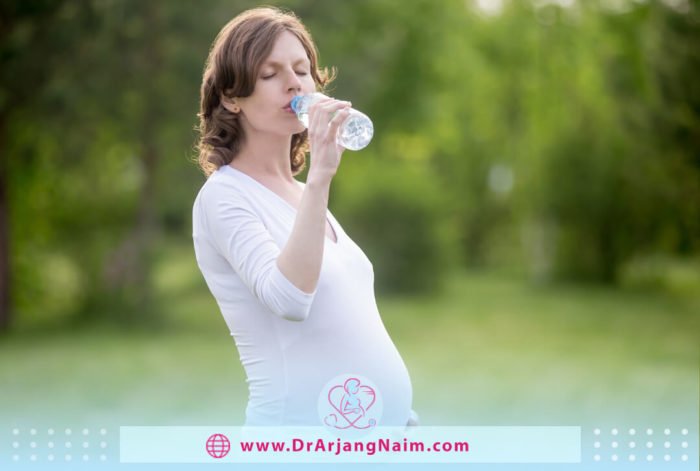
Water is not food, but adequate consumption during pregnancy is critical. Therefore, a pregnant woman must drink 8 to 10 glasses of water a day. Water plays a key role in delivering nutrients to the baby and helping his body build new cells. Staying hydrated is also important for the mother. Getting enough water is one of the best ways to prevent constipation during pregnancy. In addition, dehydration can increase the risk of preterm birth.
Foods to avoid during pregnancy
One of the first things that people notice during pregnancy is the forbidden foods during pregnancy. Some foods should be consumed rarely during pregnancy, while others should be avoided.
High mercury fish
Mercury is a highly toxic element that is mostly found in polluted waters and is prohibited in pregnancy. Mercury in high amounts can be toxic to the immune system, nervous system, and kidneys. It can also cause serious developmental problems in children and can have side effects, even in small amounts. Mercury is found in polluted seas, so large marine fish can contain large amounts of mercury. Therefore, it is better to avoid eating high-mercury fish during this period and breastfeeding.
Fish with high levels of mercury include:
- Shark
- Swordfish
- King mackerel
- Tuna (especially bigeye tuna)
- Marlin
- Tilefish from the Gulf of Mexico
- Orange roughy
Not all fish are high in mercury, but only certain types have it. Consumption of low-mercury fish during pregnancy is very healthy, and according to FDA, these fish can be consumed up to three times a week.
Low mercury fish include:
- Anchovies
- Cod
- Flounder
- Haddock
- Salmon
- Tilapia
- Trout (freshwater)
Undercooked or raw fish
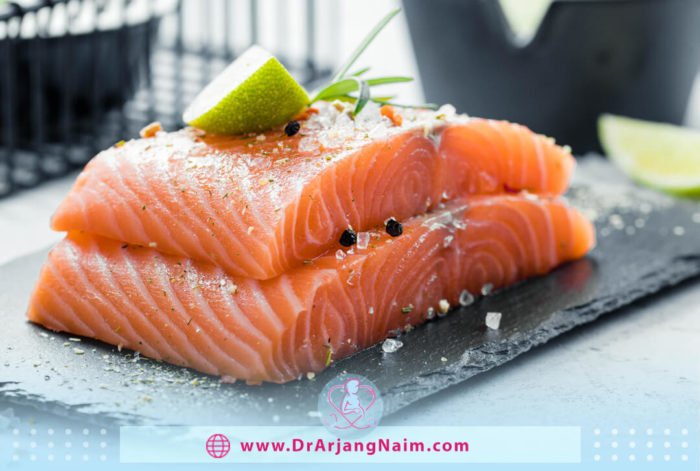
Raw fish, especially oysters, can cause various infections, including bacterial, viral, or parasitic infections such as norovirus, Salmonella, Vibrio, and Listeria. Some of these infections may only cause weakness. Other infections can be passed on to children with serious or even fatal consequences. Pregnant women are especially at risk for listeria infections. Pregnant women get listeria up to 10 times more common than the general population.
This bacterium can be found in contaminated soil, water, or plants. Raw fish can become infected during processing, including drying or smoking. Listeria can be transmitted to the baby through the placenta. Even if there are no signs of the disease, it can lead to premature birth, miscarriage, stillbirth, and other serious health problems. It is definitely recommended that pregnant women avoid fish and raw oysters, including sushi.
Raw eggs
Raw eggs can be infected with Salmonella bacteria. Symptoms of Salmonella infections include fever, vomiting, constipation, and diarrhea. In rare cases, the infection may cause premature birth, uterine cramps, or stillbirth.
Undercooked, raw, and processed meat
Eating uncooked or raw meat increases the risk of several bacteria or parasites, including E. coli, Toxoplasma, Listeria, and Salmonella.
The bacteria are harmful to the baby’s health, possibly leading to stillbirth or severe neurological diseases, including mental retardation, blindness, and epilepsy. Women during pregnancy should not use processed meat products in their diet unless they’ve been reheated until steaming hot.
Organ meat
Organ meat contains iron, zinc, selenium, vitamin B12, vitamin A, and copper, all of which are good for mother and baby. However, taking too much vitamin A during pregnancy is not recommended. Excessive intake of vitamin A, especially in the first trimester of pregnancy, can lead to miscarriage and birth defects. Although this source is mostly related to vitamin A supplements, it is best to keep eating body meats such as liver only a few ounces per week.
Caffeine
According to the American College of Obstetricians and Gynecologists, pregnant women are generally advised to reduce their caffeine intake to less than 200 mg per day. Caffeine is absorbed very quickly and is easily transferred to the placenta. babies and their placentas do not have the basic enzymes needed for caffeine metabolism, so caffeine levels increase.
Excessive caffeine consumption during pregnancy has been shown to limit fetal growth and increase the risk of low birth weight.
Unwashed produce
The surface of fruits and vegetables without washing or peeling may be infected with several bacteria and parasites. These include Toxoplasma, E. coli, Salmonella, and Listeria, which can be contaminated from the soil or during harvest.
Most babies who are infected with Toxoplasma bacteria in utero have no symptoms from birth. However, symptoms such as blindness or mental disorders may develop late in life. In addition, a small percentage of infected babies are born with severe eye or brain damage. During pregnancy, minimize the risk of infection by thoroughly washing, peeling, or cooking fruits and vegetables.
Raw sprouts
Raw sprouts, including clover, alfalfa, radish, and mung bean sprouts, may be infected with Salmonella. The humid environment required by the seeds to start germination is ideal for these types of bacteria, and it is almost impossible to wash them off. For this reason, it is recommended that pregnant women generally avoid eating raw sprouts. However, the sprouts are safe after cooking.
Alcohol
Absolutely avoid alcohol during pregnancy because it increases the risk of miscarriage and stillbirth. Even small amounts can adversely affect a child’s brain development. Drinking alcohol during pregnancy can also cause fetal alcohol syndrome, which includes heart defects and mental retardation.
Unpasteurized milk, cheese, and fruit juice
Raw milk, soft-ripened cheeses, and unpasteurized cheese can contain an array of harmful bacteria, including Listeria, E. coli, Salmonella and Campylobacter. There are also harmful bacteria in unpasteurized water that are prone to bacterial contamination. All infections have life-threatening consequences for the unborn baby. These bacteria can be present naturally or as a result of contamination during storage or collection. Pasteurization is the best and most effective way to kill any harmful bacteria without changing the nutritional value of the products.
Processed junk foods

Pregnancy is the best time to start eating nutrient-rich foods that are good for both the pregnant mother and the developing fetus. Many essential nutrients are needed during this time, including protein, folate, choline, and iron.
In the first trimester of pregnancy, the mother can eat as before; the amount of food consumed in the second trimester is about 350 calories per day and in the third trimester is about 450 calories per day. An optimal pregnancy diet should consist mainly of whole foods with plenty of nutrients. Processed foods are low in nutrients and high in calories, sugar, and fat. Meals and snacks eaten during pregnancy should be rich in protein, vegetables and fruits, healthy fats, and high-fiber carbohydrates such as whole grains, beans, and starchy vegetables.
The bottom line
During pregnancy, the body experiences many hormonal and physical changes, where nutrition becomes very important during pregnancy. Every food that the mother consumes affects the health of herself and the baby.
Therefore, all food groups should be used, and the focus should be on the consumption of foods that are important for health, and foods that may adversely affect the health of mother and fetus should be avoided.
Additional questions
- How many times a day should a pregnant woman eat?
Three small but balanced meals and three light snacks throughout the day is a good meal plan to ensure that the nutritional needs of mother and baby are met.
- Why do babies move after eating?
The baby may become more active about an hour after the mother eats. This is due to increased sugar (glucose) in the mother’s blood.
- Why are you so thirsty when pregnant?
Women experience extreme thirst during pregnancy because the mother’s body needs extra fluids to support the baby’s growth.
- What causes stillbirth?
The most likely causes are:
- Problems with the placenta or the umbilical cord
- Preeclampsia
- Lupus
- Clotting disorders
- Lifestyle choices
- Birth defects
- Infection
- Trauma
- Is banana good for pregnancy?
Bananas’ high fiber content can help with pregnancy-related constipation, and the vitamin B-6 in bananas can help relieve nausea and vomiting in early pregnancy.
References:
https://www.pregnancybirthbaby.org.au/foods-to-avoid-when-pregnant
https://www.whattoexpect.com/pregnancy/eating-well/week-11/big-nutrition-small-packages.aspx
https://www.medicalnewstoday.com/articles/246404#summary
https://www.healthline.com/nutrition/11-foods-to-avoid-during-pregnancy#11.-Processed-junk-foods
